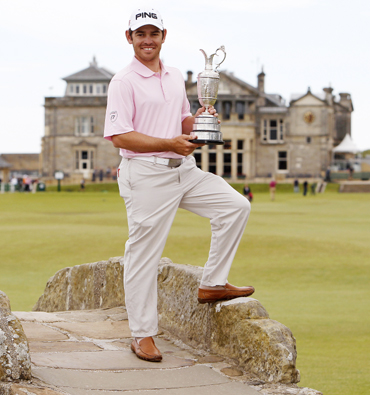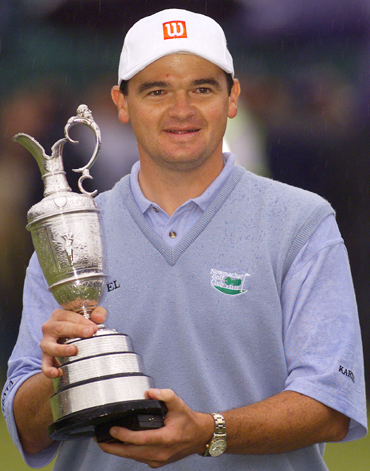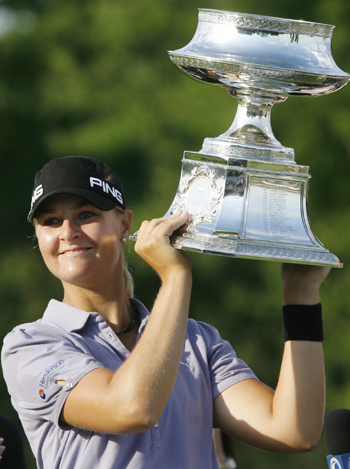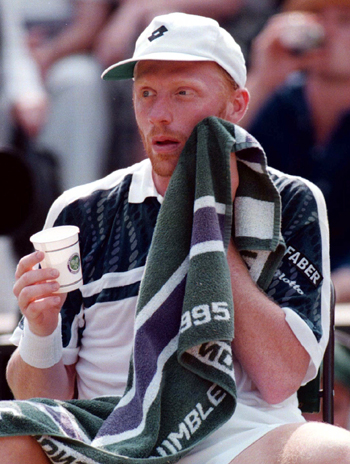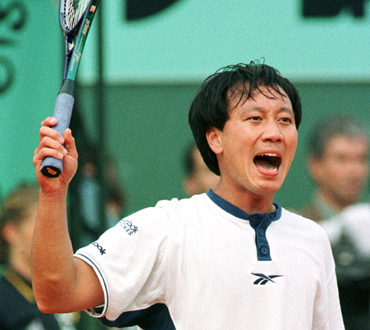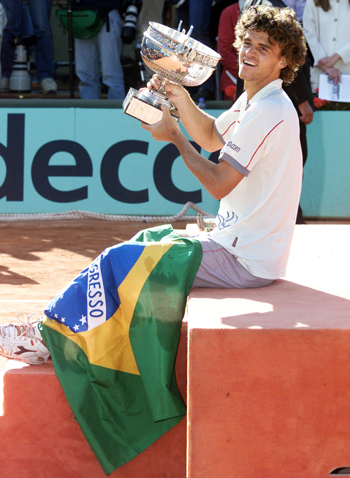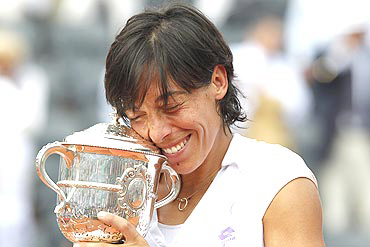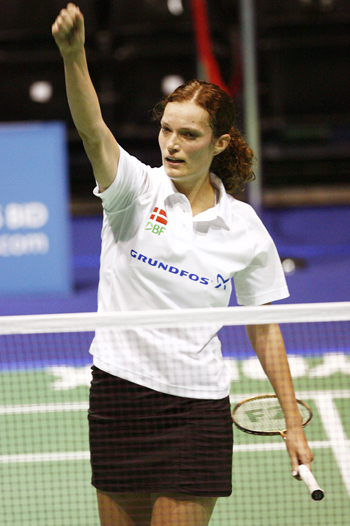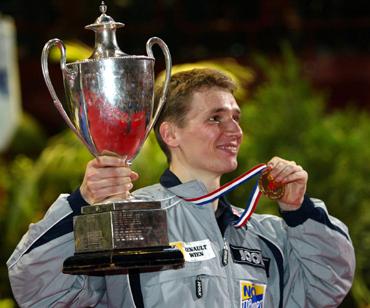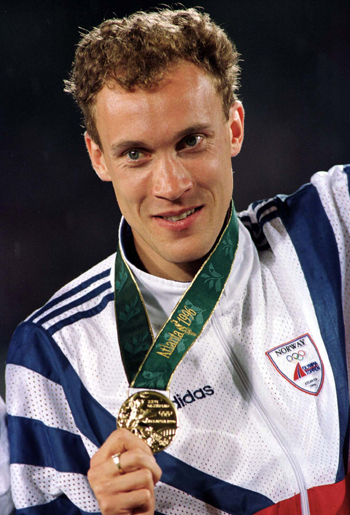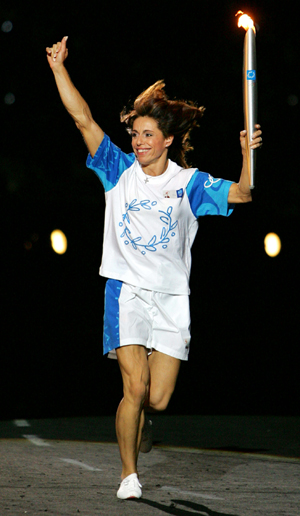 | « Back to article | Print this article |
Oosthuizen: An outsider who conquered the Open
Louis Oosthuizen.
The surname is a tongue twister and may not necessarily ring a bell to most.
Even now when the gentleman from South Africa is the new Open champion.
Considered a 200/1 outsider at the start of the 139th edition of the premier golf tournament, the 27-year-old shocked everyone with a seven-shot winning margin over the third-ranked Lee Westwood.
Oosthuizen had never made the cut in three British Opens previously and in fact, only once before in his career made the cut in a major, in the 2008 USPGA Championship.
Therefore, his triumph at the Open provides another instance of a rank outsider going on to win a coveted title.
Rediff.com takes a look at some other such instances in recent years.*
* The references are limited to recent times and we have excluded team sports from the discussion as it is practically impossible to include so many names in such limited space.
The Scotsman's Open win is considered a fluke
Paul Lawrie (Scotland)
Since golf is our reference point, our first example is Paul Lawrie.
The Scotsman was unheralded when he shocked the world, and probably himself, by winning the Open Championships at Carnoustie in 1999.
Aged 30 then, Lawrie had been a pro for 13 years but his lone good show at a major had been a sixth place finish at the 1993 Open.
Lawrie won the competition after a four hole play-off with Frenchman Jean Van de Velde and American Justin Leonard.
The Open that year was as much about Lawrie's win as it was about Van de Velde famously throwing away a three-shot lead on the final hole.
Lawrie returned to relative obscurity thereafter. So much so that his win at Carnoustie is considered a fluke.
For the record, he missed the cut at the Open this year.
Nordqvist: A perfect replacement for Sorenstam
Anna Nordqvist (Sweden)
Arguably one of the biggest shocks in recent years in ladies golf.
Anna Nordqvist, in only her fifth start on the LPGA tour, won her first professional tournament.
And it happened to be a major.
The Swede began the final round of the LPGA Championship at Bulle Rock last year with a two-shot lead and ended up edging out Lindsay Wright of Australia.
Nordqvist had won the British Amateur championship in 2008 but her triumph at Bulle Rock heralded the passing of the baton from the legendary Annika Sorenstam who retired a year earlier.
The Swede, as if to prove that her major win was no fluke, also won the inaugural LPGA Tour Championship last year beating the then World No. 1 Lorena Ochoa by two-strokes in Houston.
And at 23, she has a lot of time to add to her major tally.
Becker made history at Big W
Boris Becker (Germany)
Most remember this wonderful moment at the All England Club.
In 1985, Boris Becker, a 17-year-old German became the youngest ever player to win the Wimbledon and the first unseeded champion.
It took Becker just three hours and 18 minutes to overpower eighth-seeded Kevin Curren 6-3, 6-7, 7-6, 6-4 and take home the title.
A few backs at the Queen's Club, the young German had won his first professional title.
However, it wasn't a bed of roses all the way for Becker.
In his first appearance at the All England Club a year before, the German had to pull out of his third round match against Bill Scanlon with an ankle injury - an injury that kept him off court for three months.
Becker recovered well though, reaching the quarter-finals at the Australian Open.
He wasn't seeded for the Wimbledon that year though, because he was ranked just 20th at the time.
It didn't deter him though as the young German beat higher-ranked opponents to take home the coveted trophy.
At the end of it all Becker had played 292 games in his seven matches, four times had played four set matches, twice had to come through in five sets and dropped eight sets en route.
And the rest, as they say, is history.
It remains Chang's biggest achievement
Michael Chang (USA)
Till the 1989 French Open, Michael Chang had done nothing significant.
And that year he did something at Roland Garros which till date remains his biggest achievement.
Chang, then 17, became the youngest-ever male player to win a major title when he defeated Stefan Edberg of Sweden 6-1, 3-6, 4-6, 6-4, 6-2 in the final.
The win made him the first American to win the men's singles title at the French Open since Tony Trabert in 1955.
And despite reaching three other major finals in his 15-year-career, Chang couldn't add to his major tally.
Guga's was a victory to cherish
Gustavo Kuerten (Brazil)
An unheard of entity till then Gustavo Kuerten, at the 1997 French Open, became the first Brazilian to win a men's singles title at a major when tournament.
And it was a victory to cherish.
For Kuerten had, en route to the title, accounted for three former champions: Thomas Muster (third round), Yevgeny Kafelnikov (quarterfinals) and Sergi Bruguera (final).
Then ranked 66th, Kuerten became the third-lowest ranked major champion behind Mark Edmondson (212th) and Goran Ivanisevic (125th).
And his winning his first slam in only his third attempt made him the second fastest - after Rafael Nadal - of any player in the Open era.
Guga, as he is often referred to, went on to win two more titles at the Roland Garros in 2000 and 2001.
Schiavone ensured an Italian first
Francesca Schiavone (Italy)
This one is fresh in memory.
Last month Francesca Schiavone became the first Italian woman to win a Grand Slam singles title when she beat Australia's Samantha Stosur 6-4, 7-6 in the final of the French Open.
The win also made her, at 29, the oldest woman to win her first major title since Ann Jones won Wimbledon in 1969.
Till her triumph at Roland Garros, Schiavone was virtually a non-entity.
For Schiavone, who turned professional in 1998, it took 12 years of hard graft to finally realise her dream.
But even if it came late, the success was sweet nonetheless.
Dane and now
Tine Rasmussen (Denmark)
For the unitiated she is the one who halted Saina Nehwal's run at the All England this year.
Tine Rasmussen made her debut in 2002.
But despite being on the circuit for quite a few years, the Dane remained largely anonymous till her triumph at the All England Championships in 2008.
After the retirement of Camilla Martin, the main threat to the Chinese for more than 10 years, the slot of the challenger was left open.
And Rasmussen provided a perfect replacement for her compatriot.
A relatively late starter, Rasmussen has climbed the rungs fast post her 2008 triumph in Manchester.
The Dane has added another All England title (2010), an European title (2010) and a host of Super Series titles to her resume.
But, at 30, she has only a few years left at the top level.
The Austrian's moment of glory came in Paris
Werner Schlager (Austria)
In a sport dominated by the Chinese - and where the Swedes were the lone challengers for years - Werner Schlager brought back flashes of the Austrian dominance of the pre-World War days.
Having been a journeyman for years, the Austrian's moment of glory came in 2003, when aged 31, he was crowned the world champion.
Schlager, who had began playing table tennis when he was six years old, beat South Korea's Joo Se-Hyuk in the final in Paris to lay his hands on the coveted Swaythling Cup.
The triumph made him the first Austrian since Richard Bergmann in 1937 to win the World Championship.
Rodal made the most of Kipketer's absence
Vebjorn Rodal (Norway)
When the opportunity knocks you should grab it with both hands, they say.
That is precisely what this Norwegian did.
And as a result he earned himself the gold medal in the 800 m at the 1996 Summer Olympics at Atlanta.
It was a god send opportunity for Rodal.
For world champion Wilson Kipketer, who had emigrated from Kenya to Denmark, wasn't allowed to participate, making the field wide open.
And it was Rodal who made the most, taking the lead at the last bend and ending with a new Olympic record of 1:42.58.
The record still stands.
And so does the fact that the win was the Norwegian's only international victory.
Certainly not a Greek tragedy this!
Paraskevi 'Voula' Patoulidou (Greece)
Another example of grasping an opportunity with both hands.
And certainly one of the two most unlikely Olympic consuests (besides Rodal's) in the last 20 years.
Paraskevi Patoulidou became a sporting icon in Greece when she won the Women's 100 m hurdles at the Barcelona Olympics in 1992.
Having qualifed for the final - by improving her personal best and becoming the first Greek woman ever to reach a track final in the Olympics - Patoulidou was celebrating even before the final had started.
A stroke of luck - favourite Gail Devers tripped on the last hurdle - helped her make further history.
Initially she thought it was a silver but replays made her joy two-fold.
Among those she beat that day in Barcelona included defending champion and world record holder Yordanka Donkova of Bulgaria.
